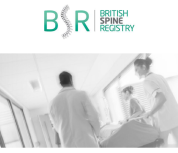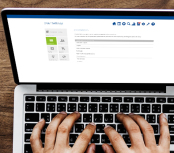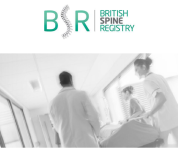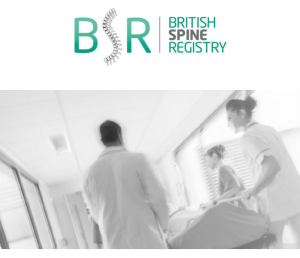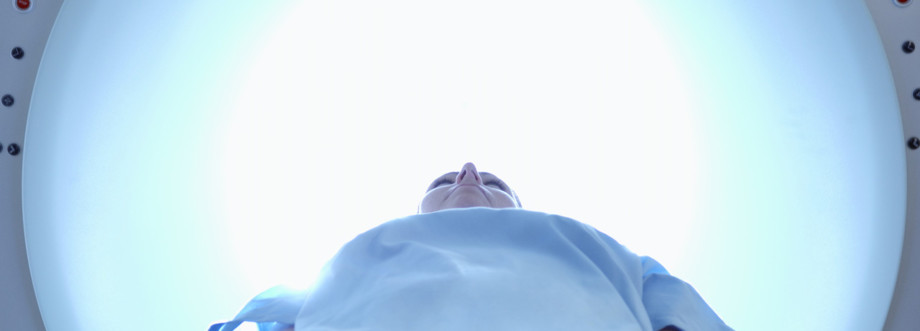
News and events
Check back here regularly to find out the latest news about the British Spine Registry.
Please note that in light of the disruption to clinics and surgery for patients due to the COVID pandemic, the auto anonymisation of patient records with the status of Consent Not Yet Recorded has been extended from 90 days to 180 days.
Please note if a patient has explicitly picked NOT consented, these will still immediately anonymise to stay in line with GDPR requirements.
Any queries please contact customer support at customer.support@amplitude-clinical.com
BSR Annual Report 2022-KG.pdf
Adobe Acrobat document [2.1 MB]
BSR Annual Report 2021.pdf
Adobe Acrobat document [325.9 KB]
BSR Annual Report 2020.pdf
Adobe Acrobat document [268.7 KB]
British Spine Registry Annual Report Yea[...]
Adobe Acrobat document [170.2 KB]
Anonymisation of non-consenting patients on the British Spine Registry
Patients with consent status of 'consent not yet recorded' will be anonymised after 31st October 2018.
Following on from communications sent out earlier in the year with regard to the changes required within the platform to remain GDPR compliant, we are reminding you that any patients with the consent status of 'consent not yet recorded', whose record was created more than 90 days prior to that date, will be anonymised after 31st October 2018.
Please identify these patients and begin the process of obtaining consent.
After this date, the system will allow 90 days to obtain consent from any new patients before an automatic anonymisation will take place on the record.
How do I identify patients without consent?
Each pathway will require a separate report to be run to identify patients without consent. The templates for these reports have been built and are housed in the
PUBLIC REPORT TEMPLATES section of the report writing tool.
Amplitude are more that happy to assist with further support on this should you require it. To book a web based training session, please contact the Amplitude Clinical Outcomes customer support team on 0333 014 6363 or customer.support@amplitude-clinical.com.
British Spine Registry hits landmark achievement with 1 millionth form completed
June, 2018.
With the advent of cheaper simpler solutions that new technology brings, clinical societies are now embracing the opportunity that a registry brings, of being able to monitor the efficacy of procedures and compare like for like outcomes.
One such group is the British Association of Spine Surgeons. They created the British Spine Registry in May 2012.
They deployed an electronic and mostly automated system, which enables spinal consultants to collect a wide remit of data on their patients for relatively little time or effort, making the registry one of the most successful platforms capturing spinal clinical outcomes data in the UK.
So successful in fact that this month, with nearly 118,000 patients in the registry, the British Spine Registry has seen its 1 millionth form submitted.
This landmark occasion has celebrated not only the immense time and effort that was put into the creation of the initial platform, but also the effort of its members to participate and contribute to the registry.
In designing the platform, the solution had to be fit for purpose and suit the requirements of BASS, whilst simultaneously meeting the needs of the clinicians adopting the platform.
Key to the continuing success of the registry is the ongoing commitment to the continued development of the solution, so that ultimately, meaningful research can be obtained well into the future.
“We are really pleased with the up-take of the British Spine Registry by our colleagues. They have seized the opportunity to propel spinal surgery forward and ensure that the best possible treatment option and quality of care is delivered to the patient.” Mike Hutton, BSR Chairman.
The most recent developments to the British Spine Registry have seen the inclusion of a funnel plot module. Each surgeon’s overall performance, measured by their patient’s average improvement, is displayed on a funnel plot, that enables them to compare their individual performance against all the other users of the registry. (All other performance figures are anonymised).
This module allows a clinician to be mindful of their own performance and look for ways to improve if they find their performance is below average, assisting continued personal development.
The BSR has also used the same technology partner to build a new referral platform. The Refer-Back platform allows hospital departments, which normally refer to specialist spinal centres via phone, to refer via an online system. The Refer-Back system offers the security of a platform hosted on an NHS N3 server, the effectiveness of an instant notification system and the reassurance of an auditable referral trail, to add to patient notes or to review at a future date if questions are raised about the patient’s treatment.
These are all innovative solutions being adopted by the NHS to improve the quality of care delivered and lower the overall costs associated with the higher demands being faced. To learn more about the British Spine Registry or for additional information on Amplitude Clinical Outcomes, the technology partner providing these software innovations to the BSR, call 0333 014 6363 or email info@amplitude-clinical.com.
British Spine Surgeons are leading the way in researching and monitoring outcomes of Spinal Procedures in the UK to provide safer, more patient focussed decisions on spinal procedures.
Back pain affects around 80% of people in the UK at some point in our lives and we spend £48 Billion each year on medical treatment, medication, benefits and lost productivity. There are studies claiming that those of us who suffer from back and neck disorders may have shortened life expectancies. A recent study in Australia suggests that chronic pain leaves us vulnerable to disease and that spinal pain may indicate a pattern of poor health and poor functional ability. It is important that UK healthcare providers take into consideration all factors about a patient in order to confidently assess appropriate treatment for individuals and to help them to have a realistic expectation of any intervention.
In 2012, the British Association of Spine Surgeons (BASS) commissioned a group of its members to establish a specialist clinical registry, the British Spinal Registry (BSR), to prospectively collect data on patients. The purpose of this initiative is to improve spinal care throughout the UK by encouraging research, audit and good clinical practices. Its aim is also to educate patients about spinal problems, the available treatments, expectations and quality of life after intervention.
The BSR operates by using a unique specialist clinical software programme, provided by British based Amplitude Clinical. It is a cost-effective, largely automated system that is also simple and engaging for patients and of little burden to busy surgeons and their staff. The result is a full and transparent understanding of clinical outcomes of surgery, whilst also taking into account the patient's quality of life pre and post operatively. The BSR approach ensures that the information is reported by patients and is clinically validated to give a meaningful and honest reflection of the quality of outcomes of individual surgeons; and of the outcomes of specific spinal procedures across the UK.
Five years of hard work and commitment from its Steering Committee and member surgeons has seen the BSR make huge and significant progress. It is now the largest medical Registry dedicated to spinal surgery in the UK with currently 1182 users monitoring an impressive 71 390 patients.
Whilst BASS encourages all surgeons in the UK to use the BSR as part of their PROMs collection and good practice, its current objective is to ensure that there is an improvement in the number of procedures recorded on the BSR.
NHS Improvement will announce on Thursday 16th March at the BASS annual conference in Manchester 2017 that from April 2017 there will be financial penalties for not recording spinal surgical procedures on the BSR.
BSR - Annual report - 2016-2017.pdf
Adobe Acrobat document [965.3 KB]
Adobe Acrobat document [1.1 MB]





